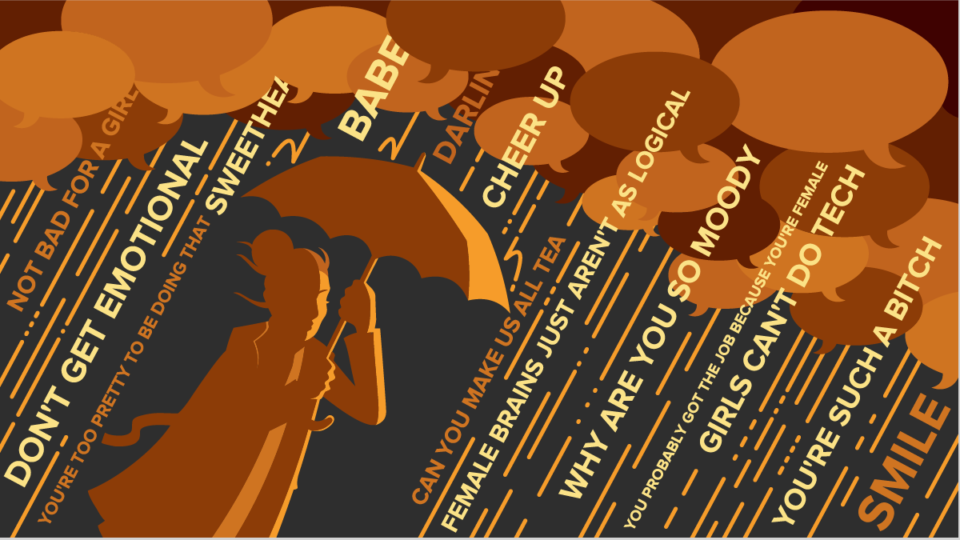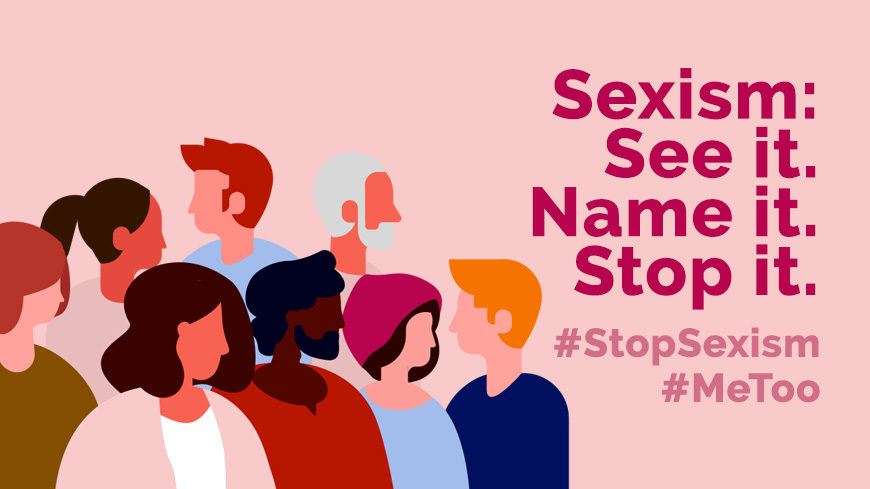By Evi Tsakali,
When I wrote the article about microaggressions, it was very liberating to express myself freely through this platform about my personal experiences of racist comments in France; but those racist comments were not the only type of comments that irritate me (and not only me). There is a type of comments that some of us hear almost daily, which are considered normal when in fact they must not be — sexist comments.
Before I proceed, I feel the need to clarify one thing: sexist comments are every woman’s business and not just a feminist thing we come up with, because we are suddenly bothered by anything. It may occur to anybody to be the victim of the casual sexism of the day, even if she behaves like she is “supposed” to, looks like she is “supposed” to, expresses herself like she is “supposed” to; in other words, even if she is the “good girl” of the patriarchy. And in the patriarchy, “good girls” do not talk. But I think that is subject to change…
I am aware of the fact that I may have lost some readers to this point, but if you would like to get in the shoes of your friend, girlfriend, sister, mother, colleague, etc. or just want to see your own conflicted emotions put into words, I think that you should give the rest a chance. For this article, I decided to ask some women in my life, some “good girls” that strive to do everything right and balance everything, to tell me the casual sexist comments they have received that for some reason we have unfortunately normalized. The result was very interesting and at the same time painfully relatable…

- “You should smile more”
…or the unrealistic expectation from you to look cheerful all the time, because that will make you pleasant and likable (which, by the way, is your role).
- “Are you on your period?”
A classic, falsely associating temper and mood swings with our menstrual cycles. Often used as a passe-partout argument to end a debate that finds them losing the argument.
- “Not that I am a feminist or anything”
This one is from personal experience. I have heard many people hurrying to make that clarification, after having expressed their opinion in favor of anything related to women’s rights, and unfortunately, most of the cases I can remember were women; women that spat out the word “feminist” as if it were an insult, wanting to prove (typical “pick me” behavior), that they are not “like those women” — “those women” who always complain, argue, and are a burden (remember: “good girls” do not talk).
- “It is not nice for women to cuss”
In general, it is not nice for anyone to cuss, but that has not really bothered humanity at all, so why should men have exclusivity? (for the record, the friend of mine who suggested this one replied “I don’t give a fuck”).
- “You were probably gossiping about everyone”
For some reason we will never understand, gossiping is a woman’s world. It has occurred to me multiple times that men have the impression that when women get together, all they do is gossip. Of course, “spilling the tea” sometimes is in the schedule, but not our only schedule. Gossip can be a very bad habit, which is indicative of a person’s character, not gender. And in the end, most of the time we have much more important things to talk about.
- “What were you wearing?”
Alternatively, “do not wear that outside” or “where are you going dressed like that?” or “are you seeking attention with this outfit you chose?”, this is one of the most hurtful remarks, especially when it comes from people you care about. It is considered normal to blame the recipient of a disturbing (and if taken too far, illegal) action of harassment rather than strive to change the mentality that allows (and sometimes encourages) such phenomena to exist. It is like going to the police department to report a theft of your belongings while you were walking in a neighborhood that is not very safe and being blamed because you walked in a specific neighborhood. The world’s problem is not girls wearing short skirts, but the fact that they cannot walk home safely at night (even in the middle of the day, in some cases). Many people would think that such remarks are not a big deal or that you receive them if you choose specific articles of clothing, neither of those could be less true. Such remarks make you doubt yourself, adopt a label (that of the “slut” or “the attention seeker”) that some third party imposed on you, or even not want to wear some of your clothes anymore (even the ones that made you feel happy or pretty or both). No matter how strong a character you are, these words will be engraved in your mind and it will not be your fault. You will wonder what you did wrong, you may think that you are always dressed appropriately, that you are a “good girl” (but “good girls” do not talk, so do not dare respond), and especially if you are still at a young age (because unfortunately, it is also considered normal to say that to girls as young as 12, for example) it will be engraved in your mind that you are a sexualized being, a trait that you ought to show à la carte; pretty, but not too pretty to be called a slut, smart, but not that smart to make your male companion feel threatened (as I have heard from a high school teacher, who once told us in class about a date of his: “I do not want to hear about Nietzsche, I want to have sex”).
- “Three years here and only one of you has been in a relationship?”
I know this one is quite specific, so it is obvious that it is a personal experience, and quite recent which, however, is a comment that may ring a bell in slightly different forms. A guy at the residence I live in France, after a long conversation on political and social issues and about our aspirations for the future with me and a friend of mine (both of us study for two degrees at the same time, speak many foreign languages, have specific academic and professional plans which we mentioned during that conversation) asked surprised (almost petrified) how it is possible that after two to three years in Paris, only one of us has been in a relationship. After all that, this was his only question and I will leave the comments to you.

Unfortunately, I will need to stop here, but I assure you that the list could go on for ages (if you stop to think about it, there are many stereotypical phrases that we tolerate every day, like “do not talk like a boy”, “do not dress like a boy”, “you are a girl, do not sit like that”, and so on). I stated at the beginning of the article that I asked some women that I love to make their contributions, and I was filled with replies in minutes. I was so happy about their willingness to help me and at the same time so sad that they have been told such things. It is with deep regret that I could not fit everything in this article, and the deepest regret that I intentionally decided to remain quite vague and discreet at some descriptions because otherwise I would be too honest (and that would be too bold at this point). Nevertheless, I have wanted to write this article for a long time, and I sincerely hope that some of the readers will feel represented.
PS: “Good girls” do not talk, but being a good girl is overrated…




